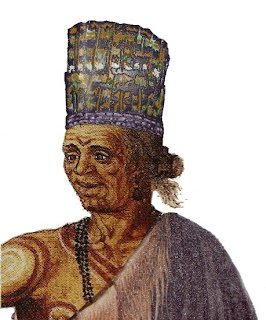Opechancanough, war
chief of the Pamunkey tribal
confederation, was commander of the unsuccessful half-century effort to
expel the English colonists around Jamestown ,
Virginia America
One
such moment came in 1607. After a series of minor skirmishes, Opechancanough captured Captain John
Smith who was freed following the entreaties of Pocahantas, the war chief’s niece.
Several years later, in a symmetrical reversal of fortune, the Englishman returned
the favor, freeing Opechancanough after taking his one-time captor hostage. Instead
of calming the situation, these prisoner exchanges and other political gestures
failed to prevent the first Anglo-Powhatan War. Waged from 1609-1614, the war
concluded in a distinctly traditional way, with a “royal” wedding of Pocahantas
to colonist leader John Rolfe. But deep resentments and affronts by both sides
persisted, nor could Opechancanough
forget his humiliating treatment at the hands of the English invaders.
Warfare
commenced anew on March 22, 1622 with a murderous surprise attack led by
Opechancanough, already in his late sixties. More than 500 settlers – nearly
one quarter of the entire colony population – were slaughtered in a single day.
A low-level guerilla war, punctuated by several set piece battles and marked by
savagery on both sides, then raged for almost fifteen years. Steady immigration
from England
On
April 18, 1644, the old chief, now nearly 90 and carried into battle on a
litter, mounted one final onslaught on the settlers. Although once again
achieving tactical surprise and killing more than 300 settlers – another
tremendous psychological blow to the English enemy - the Powhatan Confederation
was not strong enough to consolidate its victory and by the end of the month the
English captured the old man. In a spectacle reminiscent of the Roman treatment
of enemy commanders, he was paraded through the streets of Jamestown
Opechancanough,
who had been a thorn in the side of the settlers for more than forty years, was
imprisoned and in a still unexplained incident, murdered by one of his guards,
the first “American” general to die as a prisoner of war. The strength of the
Confederation was totally broken and the pattern was fixed for two and a half
centuries of European expansion and displacement of the indigenous peoples in America
A
consummate practitioner of irregular warfare and skilled in the arts of guile, deception,
and diplomacy, Opechancanough disappeared centuries ago from the annals of
great American commanders. A battlefield leader who earned the loyalty of his
warriors by sharing their hardships and risks, even in old age, and a careful
planner, he was defeated by an insurmountable qualitative enemy advantage in
weaponry and numbers. In spite of that, however, he came incredibly close to
ending the English colonial penetration of Virginia




Nice article.. ancestry. Com shows him my 10th great Grandfather. Thru the direct Floyd male line. Awsome lost untold history ty very much nice read...
ReplyDelete